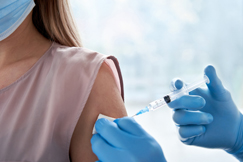NCD Watch
Non-communicable Diseases and Vaccination Against COVID-19
30 Jul 2021 (Fri)

The coronavirus disease 2019 (COVID-19) pandemic continues to present challenges worldwide. While people of all ages can be infected with the novel coronavirus, individuals with underlying chronic non-communicable diseases (NCDs) are particularly vulnerable to severe and fatal COVID-19 infection. Vaccines are a crucial tool in reducing disease, disability and death. They work by training and preparing the body’s natural defenses – the immune system – to recognise and fight against the bacteria and viruses they target.
With great efforts, scientists have come up with several COVID-19 vaccines which meet the necessary criteria for safety and efficacy in preventing people from being infected, getting seriously ill or dying from the disease, including Comirnaty (BioNTech) vaccine and CoronaVac (Sinovac) that have been approved for emergency use by the World Health Organization and the Hong Kong SAR Government. Among individuals with specific prevalent chronic illnesses, study of 1.4 million patients in Israel showed that the vaccine (BioNTech) was 93–96% effective against symptomatic infection for overweight and obese patients, 86% for patients with diabetes, 80% for both patients with heart disease and chronic kidney disease.
The vast majority of population are suitable for COVID-19 vaccination. In general, there are three important considerations whether to receive vaccination, including medical condition, the best time for vaccination, and allergic history. Experts recommend that any elderly who have received influenza vaccines before can safely receive COVID-19 vaccines. Elderly and individuals with chronic diseases are vulnerable to COVID-19 infection with increased mortality. Therefore, unless with contraindications, people with stable clinical conditions should receive COVID-19 vaccines as soon as possible for their personal protection. They are encouraged to consult doctors about COVID-19 vaccination and the best timing for vaccination.
Like any vaccine, COVID-19 vaccines can cause side effects. In general, common side effects like fever, soreness, redness, or swelling at the injection site which are usually mild and temporary. Some may experience more severe, but generally rare, adverse effects. If side effects do not seem to be going away in a few days or are worrying you, contact your doctor or other healthcare professionals (e.g. pharmacists, nurses and Chinese medicine practitioners). They would offer advice, manage your condition and make proper assessment for reporting to the Department of Health (DH) any adverse event following vaccination that is deemed medically significant.
In the wake of COVID-19 pandemic, healthy living is equally important for overall health with a robust immune system. Studies showed that those with the most unfavourable lifestyle had about four times the risk for COVID-19 hospitalisation compared to persons with the most optimal lifestyle. Thus, while observing the necessary precautions (such as maintaining good personal hygiene, wearing masks in public places, and reducing social contact), members of the public are urged to lead a healthy lifestyle that includes eating a balanced diet, being physically active, no smoking and refrain from alcohol consumption.
Together, we keep healthy, get vaccinated and fight the virus!
For more information about COVID-19 Vaccination Programme, including vaccination venues and making an online booking for the vaccination, please visit: www.covidvaccine.gov.hk/enThis link will open in a new window.






































